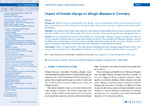Impact of climate change on allergic diseases in Germany
Bergmann, Karl-Christian
Brehler, Randolf
Endler, Christina
Höflich, Conny
Kespohl, Sabine
Plaza, Maria
Raulf, Monika
Standl, Marie
Thamm, Roma
Traidl-Hoffmann, Claudia
Werchan, Barbora
Background: Allergic diseases, especially inhalant allergies, have reached epidemic levels and environmental factors play an important role in their development. Climate change influences the occurrence, frequency, and severity of allergic diseases.
Methods: The contents of this article were selected by the authors and developed section by section according to their expertise and the current state of knowledge. The sections were then discussed and agreed upon amongst all authors.
Results: The article highlights direct and indirect effects of climate change on allergies. It goes into detail about the connections between climate change and (new) pollen allergens as well as (new) occupational inhalation allergens, explains the effects of climate change on the clinical picture of atopic dermatitis, discusses the connections between air pollutants and allergies, and provides information about the phenomenon of thunderstorm asthma.
Conclusions: There is a need for action in the field of pollen and fungal spore monitoring, allergy and sensitisation monitoring, urban planning from an allergological perspective, and changes in the working environment, among others.
This is part of a series of articles that constitute the German Status Report on Climate Change and Health 2023.
Files in this item

